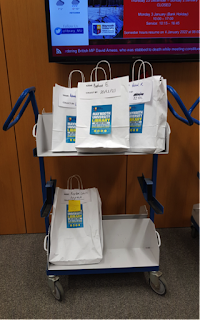Guest post by Kate Hawkins, Library Assistant, Engagement and Information Services, Maynooth University Library
Introduction
This blog post explores my experience of the Maynooth University (MU) Library service as a student and as a library staff member. Initially, as a postgraduate student, I worked with the Library Facilities and Events Team (F&E) for a year from October 2020. Next, I took up a post as a Library Assistant providing front line desk services. I will outline the duties associated with both library posts, and what I’ve learned from both a student’s and an employee’s perspective, and how my understanding and knowledge of the world of information has grown through my experiences.
 |
John Paul II Library (Pic by Kate Hawkins) |
Undergraduate
I began my undergraduate degree in Law and English at MU in 2017. During my orientation I received a library tour and an information session about the Library. The beginning of first year was overwhelming and exciting. As law is heavily book based, I borrowed many textbooks for my law modules. I accessed the Library early in the academic year and I learned how to use the self-service machines with the help of library staff. Group study rooms were a valuable space for working with my classmates. From my second year onwards, I was selected to be an orientation leader. I felt proud to be showing the first-year students around MU. I spent time in the Library during orientation week where I met students in the foyer for their campus tour, and I brought them to meet the librarians for their interactive session on using the library. I enjoyed answering their questions and showing them how they could best use the resources to get the most out of their university studies.
 |
| Self-service borrowing machines (Pic by Kate Hawkins) |
Postgraduate
I began a master's degree in International Justice at MU in September 2020. It was a full-time course that linked to aspects of my undergraduate degree and allowed me to explore these topics in more detail. I completed my masters during the COVID-19 pandemic which was overwhelming at times, both with adjusting to studying remotely and online lectures. Thankfully the Library continued to offer a comprehensive service during this time. As all my lectures were online, most of my experience with the Library was as a remote user. When restrictions eased, I was able to book a study space in the Library for a three-hour period. That was an opportunity to read textbooks and consult British and Irish journals that were available in print only. The online service I used most frequently was the library search function on the MU Library homepage to find journal articles and eBooks. I used legal databases such as Westlaw and Lexis Library to read important case law for assignments, and for my dissertation. Some older textbooks were available online as eBooks. I used the digital on demand service for chapters of law textbooks when studying remotely. I did not use the click and collect service, however now as a staff member I notice the benefits of this service for MU students.
 |
| Click and Collect Service (Pic by Kate Hawkins) |
Member of Facilities and Events (F&E) Team
When my postgraduate studies began, I started work as a member of the Facilities and Events (F&E) team. This post is restricted to MU postgraduates. Due to the pandemic, there were no in-person events at MU Library, and I was not involved in online events. We conducted daily fire safety checks and contact tracing and mask checks, when students were back on site. Occasionally we were given projects. Two of us were tasked with creating an Excel spreadsheet in a Microsoft Team folder, with information on the layout of university library websites in Ireland and abroad. We recorded features of their homepages that we didn’t have on our website and added links to their websites. Transitioning to accommodate the easing of restrictions was a major project that the whole team was involved in. We placed QR codes on the appropriate desks and socially distanced the furniture. We made new signs to put around the library. It was great to be a part of the library orientation team week in 2021, especially meeting new students. When my time as a member of the F&E team was coming to an end, I trained new members of the team. It felt good to share my experiences and knowledge with them.
 |
Maynooth University Library Homepage (Pic by: Maynooth University)
|
Engagement and Information Service (EIS)
I was delighted when my application for EIS Library assistant was successful. I was nervous starting this job; there was a lot to learn. I was also excited. Now I am learning more about how libraries operate, and about MU Library’s policies and procedures. Recently I learned that there are multiple ways for library users to communicate with library staff including via different e-mail addresses and the library chat service. I use Libapps for answering student queries and click and collect requests. We rotate roles during shifts. I’m learning about the importance of keeping statistics, to demonstrate how our services are being used. I enjoy interacting with students and assisting them. Each shift brings something different a new query, a new library database to explore or a new book to find!
 |
EIS Desk (Pic by Kate Hawkins)
Where next?
I am enjoying my work as a Library assistant and am looking forward to learning more about the Library. I enjoy combining working as a Library Assistant with exploring my interest in human rights and immigration law. I attended the Library Outside In Lecture (this is part of a series of guest lectures) given by a Maynooth University graduate who spent six years living in Direct Provision while an MU student. We are a University of Sanctuary, and I hope to explore this more and write about it.














